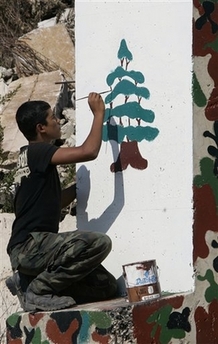 CAIRO (Reuters) – Lebanon said on Wednesday two Israeli soldiers captured by Hizbollah would not be released unless Israel was prepared to discuss a prisoner swap. The unconditional release of the soldiers, whose seizure by the Lebanese Hizbollah guerrilla group in a cross-border raid on July 12 sparked a 34-day war, is called for in the preamble to a UN security council resolution that brought about a ceasefire.
CAIRO (Reuters) – Lebanon said on Wednesday two Israeli soldiers captured by Hizbollah would not be released unless Israel was prepared to discuss a prisoner swap. The unconditional release of the soldiers, whose seizure by the Lebanese Hizbollah guerrilla group in a cross-border raid on July 12 sparked a 34-day war, is called for in the preamble to a UN security council resolution that brought about a ceasefire.
The same preamble "encourages" the settling of the issue of Lebanese prisoners detained in Israel."Neither of the two Israeli soldiers will be released unless there are negotiations over the exchange of Lebanese and Israeli prisoners," Lebanese Foreign Minister Fawzi Salloukh told reporters at an Arab foreign ministers’ meeting in Cairo.Hizbollah has two ministers in the Lebanese government.
Israeli Foreign Ministry spokesman Mark Regev said Hizbollah’s continued detention of the soldiers violated the Security Council resolution, and that Lebanon must act to release them unconditionally."U.N. Security Council Resolution 1701, on which the ceasefire is based, calls unequivocally for an unconditional and immediate release of the soldiers being held hostage," he said.
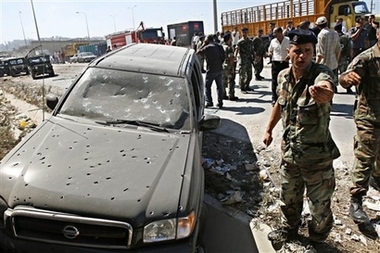 A remote-controlled bomb on Tuesday wounded a senior police intelligence officer who played a key role in the investigation into the assassination of the former Lebanese prime minister Rafik Hariri. Security officials said four of the officer’s aides and bodyguards were killed and five others wounded in a sophisticated attack in south Lebanon. Lieutenant Colonel Samir Shehade, deputy chief of the intelligence department in Lebanon’s national police force, was taken to a hospital in the southern port city of Sidon. His condition was stable, hospital officials said.
A remote-controlled bomb on Tuesday wounded a senior police intelligence officer who played a key role in the investigation into the assassination of the former Lebanese prime minister Rafik Hariri. Security officials said four of the officer’s aides and bodyguards were killed and five others wounded in a sophisticated attack in south Lebanon. Lieutenant Colonel Samir Shehade, deputy chief of the intelligence department in Lebanon’s national police force, was taken to a hospital in the southern port city of Sidon. His condition was stable, hospital officials said. 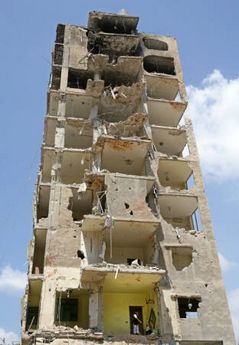 Israel agreed to lift its air and sea blockade on Lebanon on Thursday at 6 pm local time (1500 GMT) Thursday, a government statement announced. The decision came after guarantees from the United Nations and the United States that international troops would take up positions at the sea and air port in Beirut.
Israel agreed to lift its air and sea blockade on Lebanon on Thursday at 6 pm local time (1500 GMT) Thursday, a government statement announced. The decision came after guarantees from the United Nations and the United States that international troops would take up positions at the sea and air port in Beirut. 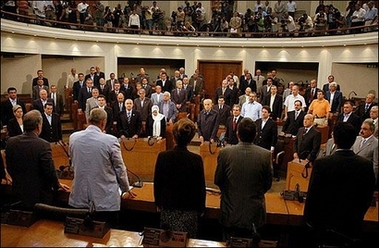 BEIRUT (AFP) – Lebanese MPs have continued for a second day their round-the-clock protest at Israel’s continued blockade, almost three weeks after a UN-brokered ceasefire in its deadly onslaught against Hezbollah. Parliament speaker Nabih Berri took part in the protest along with two ministers and nine deputies, with similar size rotations expected to continue until the blockade is lifted, officials said.
BEIRUT (AFP) – Lebanese MPs have continued for a second day their round-the-clock protest at Israel’s continued blockade, almost three weeks after a UN-brokered ceasefire in its deadly onslaught against Hezbollah. Parliament speaker Nabih Berri took part in the protest along with two ministers and nine deputies, with similar size rotations expected to continue until the blockade is lifted, officials said.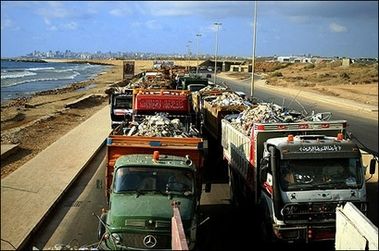 Source: WFP, Municipal workers have distributed food rations from the WFP to vulnerable families in Beirut
Source: WFP, Municipal workers have distributed food rations from the WFP to vulnerable families in Beirut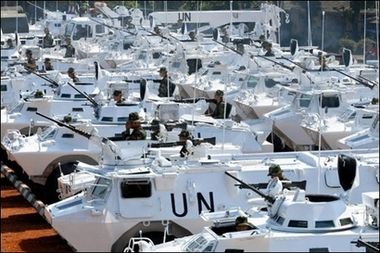 By Patrick Lannin, Reuters |
By Patrick Lannin, Reuters | 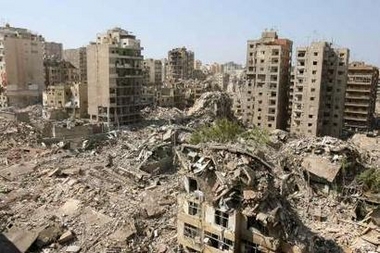 By Roula Khalaf in Beirut and Mark Turner at the United Nations, Published: August 27 2006 18:33 | Last updated: August 27 2006 18:33, The Lebanese government will on Monday press Kofi Annan, UN secretary-general, for a lifting of the Israeli air and sea blockade and appeal for international help to persuade Israel to withdraw from a disputed border area.Mr Annan arrives in Beirut on the first leg of a high-stakes Middle East tour in which he will face a dizzying array of conflicting agendas and entrenched demands.
By Roula Khalaf in Beirut and Mark Turner at the United Nations, Published: August 27 2006 18:33 | Last updated: August 27 2006 18:33, The Lebanese government will on Monday press Kofi Annan, UN secretary-general, for a lifting of the Israeli air and sea blockade and appeal for international help to persuade Israel to withdraw from a disputed border area.Mr Annan arrives in Beirut on the first leg of a high-stakes Middle East tour in which he will face a dizzying array of conflicting agendas and entrenched demands.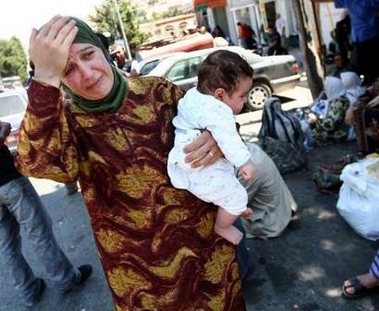 BEIRUT, 21 August (IRIN) AP – The international community should show more commitment to calls by the United Nations to strengthen the international peacekeeping force in Lebanon, said experts in Beirut. "For the ceasefire to hold, the international community needs to show more preparedness and commitment to joining the international peacekeeping force as soon as possible," said Rami Khouri, editor-at-large of The Daily Star newspaper, on Monday. There has already been a breach of the 14 August ceasefire as Israel carried out an attack on the eastern Beqaa Valley on 19 August. The UN condemned the action, saying it was a violation of UN Security Council Resolution (SCR) 1701, which calls for a cessation of hostilities between Israel and the armed wing of Lebanese political party Hezbollah. "The Secretary-General is deeply concerned about a violation by the Israeli side of the cessation of hostilities," a UN spokesman said on 19 August.
BEIRUT, 21 August (IRIN) AP – The international community should show more commitment to calls by the United Nations to strengthen the international peacekeeping force in Lebanon, said experts in Beirut. "For the ceasefire to hold, the international community needs to show more preparedness and commitment to joining the international peacekeeping force as soon as possible," said Rami Khouri, editor-at-large of The Daily Star newspaper, on Monday. There has already been a breach of the 14 August ceasefire as Israel carried out an attack on the eastern Beqaa Valley on 19 August. The UN condemned the action, saying it was a violation of UN Security Council Resolution (SCR) 1701, which calls for a cessation of hostilities between Israel and the armed wing of Lebanese political party Hezbollah. "The Secretary-General is deeply concerned about a violation by the Israeli side of the cessation of hostilities," a UN spokesman said on 19 August. 


